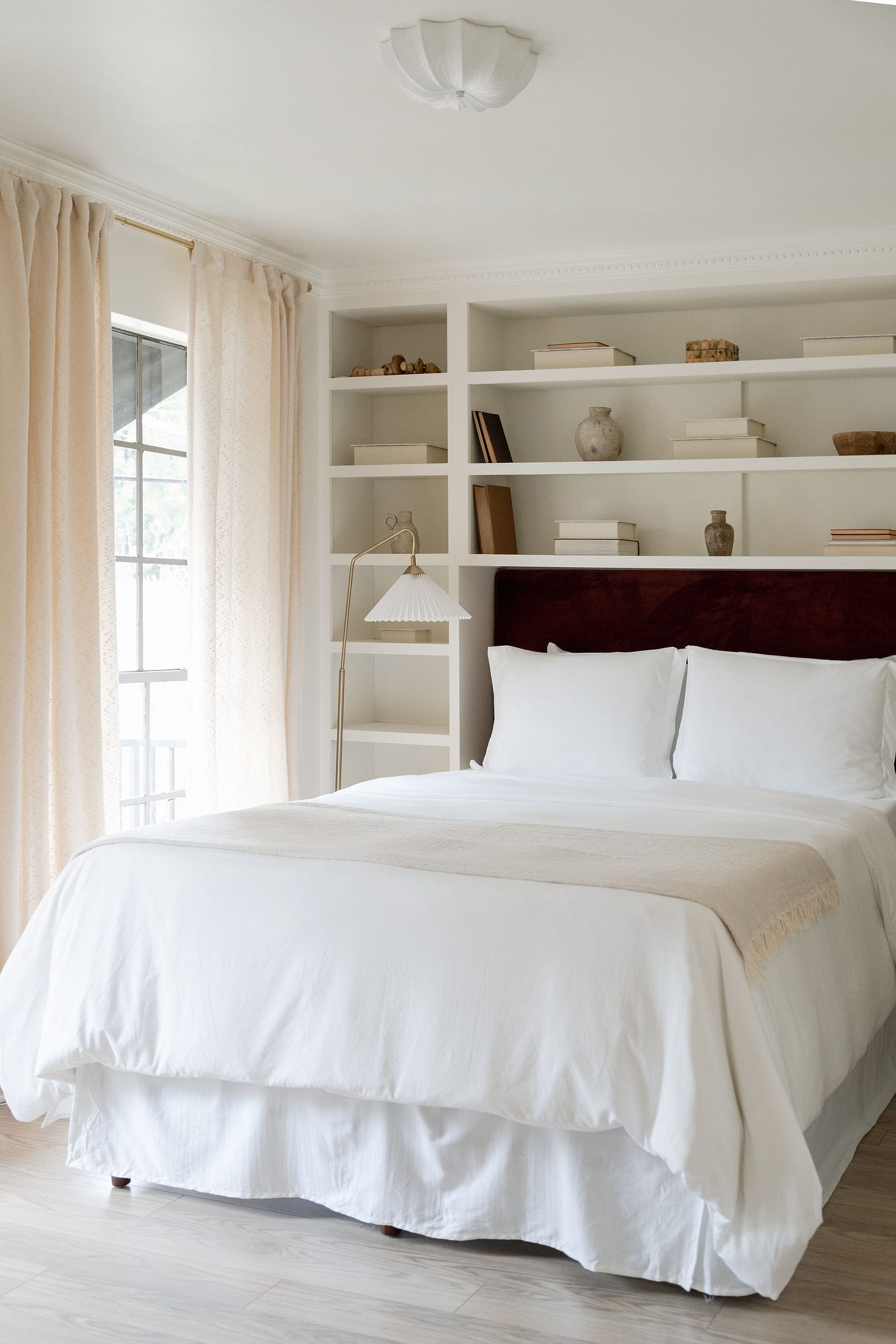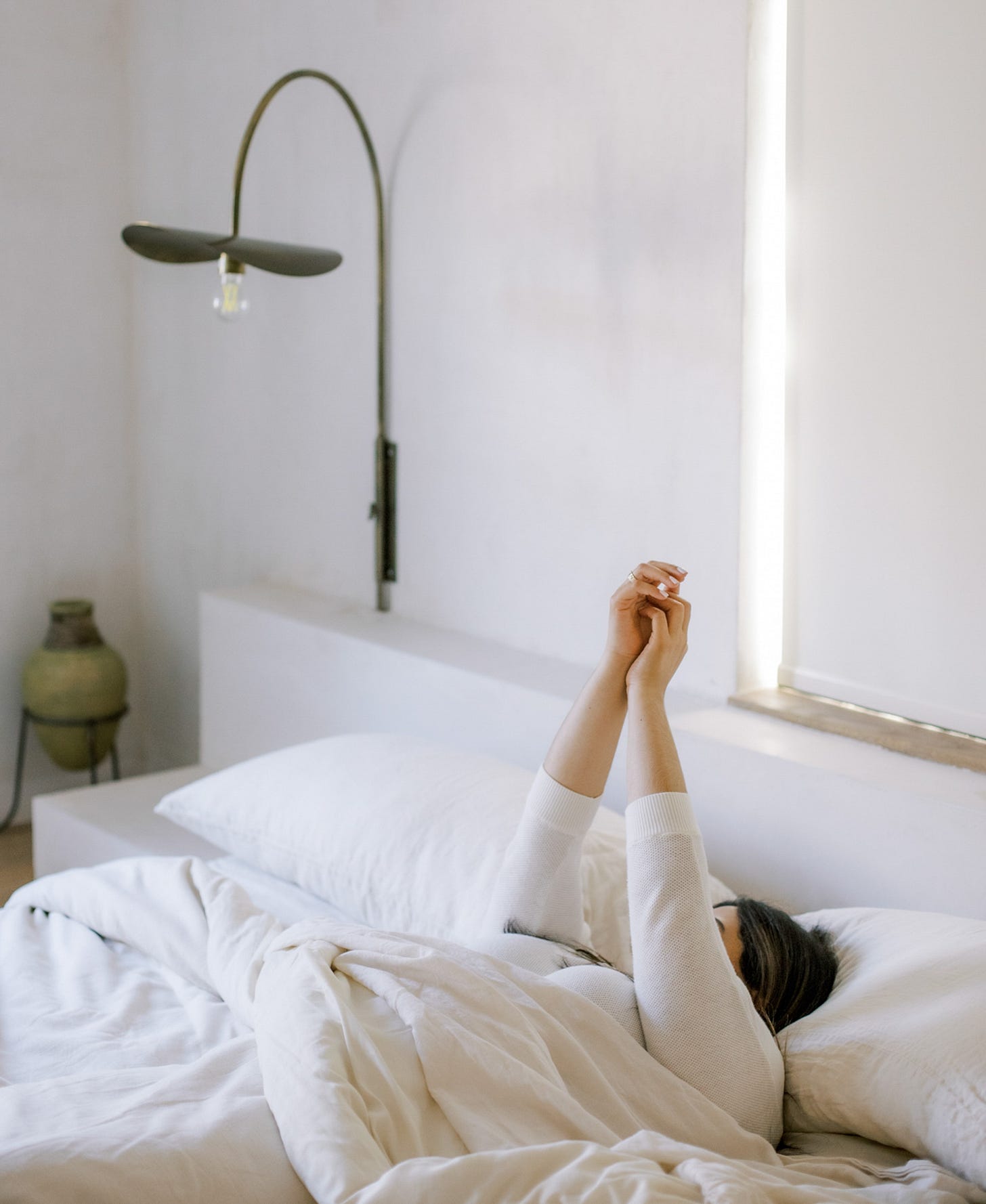40-somethings are the worst sleepers
6 sleep tips you haven’t already heard a million times before
BeWell | The Midst beauty, style & wellness newsletter
We appreciate you:
6 sleep tips you haven’t already heard a million times
By Amy Cuevas Schroeder
Raise your hand if your sleep is worse now than when you were in your 30s. In my early 40s, I would have raised my hand high. But now at 48, I sleep like a champ — and it took several changes to snooze like a rockstar.
Turns out sleep challenges are typical for folks in their 40s. According to research by Medical College of Georgia at Augusta University, 40-year-olds sleep the least. By comparison, not surprisingly, kids get the most sleep, and our sleep time will increase again around age 60, writes Dr. Xiaoling Wang, a genetic epidemiologist and co-author of the study. Research shows that 39-47% of women experience sleep challenges in perimenopause, and 40-60% of middle-aged women experience sleep problems around menopause, according to the National Library of Medicine.
Why do middle age people sleep the least?
Stress, new health problems, and hormone changes are among the most common culprits of poor sleep for women and men in our 40s and 50s.
For women, declining estrogen, progesterone, and melatonin levels, alongside peri/menopause symptoms like hot flashes and mood shifts, wreak havoc on restful sleep. Falling levels of estrogen affect body temperature making us susceptible to night sweats and hot flashes, says our resident perimenopause nutritionist Sally Duffin. The internal thermometer in the brain is highly sensitive to fluctuating estrogen and can mistakenly think we’re overheating and need to cool down with sweating and flushing. Night sweats and hot flashes can be accompanied by a burst of adrenaline and maybe some heart palpitations too. Then once we’re awake, it takes time to cool down, freshen up, and get back to sleep.
Estrogen interacts with melatonin, the primary sleep hormone, in ways that are not yet fully understood. Scientists know that melatonin levels decrease with age, and for some women the symptoms that occur during menopause can magnify this change, leading to difficulties with falling and staying asleep.
Finally, other symptoms associated with perimenopause and menopause like depression, anxiety, weight gain, and bladder problems can also interrupt sleep. “And of course, worrying about sleep makes it even harder to get to sleep, so the whole process turns into a vicious cycle,” writes Duffin.
Lack of sleep can cause more than just grogginess
“The health impacts of poor sleep are significant, ranging from increased risk of heart disease to decreased cognitive function,” writews Redeat Gebeyehu for Midi Health.
What can we do to get better sleep in midlife?
You’ve likely heard the common tips before and we’re all about them:
Exercise during the day
No caffeine at least eight hours before bedtime
Stop eating two hours before bedtime
Create a relaxing wind-down routine
Skip blue lights before bedtime
Try melatonin and other natural sleep aids
Sleep advice is not one size fits all and some people may have a sleep disorder to deal with in addition to midlife life changes. Still, we’re curious about additional modifications that may help women 35+ get the ZZZs they deserve.
Let’s get to the tips already
1. Eat plenty of quality protein during the day
Regulating your blood sugar levels during the day can make a huge difference to how well you sleep at night. If we ping-pong through the day on caffeine, sodas, and sugary snacks, our blood sugars go up and down like a rollercoaster, triggering stress hormones that interfere with melatonin activity and getting to sleep, says Duffin.
Eating balanced meals that include plenty of quality protein prevents the unnecessary release of stress hormones and keeps blood sugar levels more stable. This makes it easier to fall asleep and stay asleep at night.
Helpful protein choices include good-quality meat and fish, eggs, full-fat yogurt, beans, pulses, nuts, seeds, and tofu.
2. Try tart cherry juice
Drinking tart cherry juice, particularly those made from Montmorency cherries, may help improve sleep quality, thanks to their natural melatonin and tryptophan.
Melatonin can be made in the body from an amino acid called tryptophan, which is found in lean poultry, red meat, tofu, salmon, milk, oatmeal, and pumpkin seeds. However, some foods contain ready-made melatonin. Including these foods at lunch and evening meals may give your body a helpful boost of sleep hormones.
Best foods with ready-made melatonin
Strawberries
Salmon
Tart cherry juice
Pistachio nuts
Oatmeal
Kidney beans
Almonds
Fennel
3. Get screened for sleep apnea
Research shows that women are 3.5 times more likely to have sleep apnea at menopause than they were before menopause.
If you snore, hold your breath during sleep, wake up with dry mouth or headache, or feel sleepy during the day, ask your doctor about screening for sleep apnea, says Dr. Jade Wu, Ph.D., a behavioral sleep medicine psychologist, on Sleep.com. “This is stereotypically an older male disease, but that's only because medical research has traditionally focused on men,” she says.
4. Nix the naps
There’s nothing wrong with napping if it helps you get through the day. However, some people find napping makes them feel groggy and disoriented and less able to sleep well at night. To avoid this, try following the 30/90 sleep rule.
Keep reading with a 7-day free trial
Subscribe to The Midst to keep reading this post and get 7 days of free access to the full post archives.










